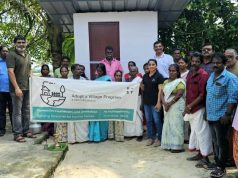CSR: India’s First Toilet College
RB (erstwhile Reckitt Benckiser), world’s leading consumer Health and Hygiene Company, in association with the World Toilet Organisation (Singapore) and Jagran Pehel, has laid the foundation of India’s first World Toilet College for sanitation workers in Aurangabad, Maharashtra. Through an effective curriculum, the World Toilet College aims to introduce an enabling program for sanitation workers. The program will help in their skill development and improvement of their socio-economic standard by providing better employment opportunities.
The workers involved in manual cleaning and handling of sewerage often face critical health issues, however are bound to continue working under these circumstances due to financial constraints and socio-psychological barriers. Public rebuke of being seen as ‘non-dignified workers’ and lack of technological substitutes add to their wretched working conditions. With this alliance, Harpic Dettol Banega Swachh India, the flagship initiative under RB, aims to provide sanitation workers with a dignified livelihood, access to basic rights and improve their self-esteem.
“Sanitation is the very foundation upon which one builds a healthy life however; unfortunately, it is also one of the biggest struggles in our country. Furthermore, it is quite sad to see the condition of the sanitation worker community and the lives they live. Launch of the World Toilet College will set an important example of an institution that will help provide the right knowledge sharing platform leading to the upliftment of one of the most important sections of the society,” said Pujya Swami Chidanand Saraswati ji, President of Parmarth Niketan Ashram and Co-Founder Global Interfaith Wash Alliance.
The curriculum at the World Toilet College will cover subjects around acceptance of toilets, cleaning methods, capacity development and more. The vocational training program will provide them access to use ICT and in-person tools, ranging from technical training to soft skills to career counselling and partnership development and will promote entrepreneurship in sanitation value chain.
“The average person uses a toilet 2,200 times per year, approximately six times daily leading to clogged sewerage systems. At various steps across the sanitation value chain, workers interact with faecal sludge in extremely unsafe ways with inadequate safety equipment and training. They are also socially and culturally ostracised,” said Mr. Jack Sim, Founder, World Toilet Organisation.
As part of continued efforts to improve sanitation and hygiene, the company has built 17,000 toilets out of the 25,000 toilets it aims to create through people participation. It also partnered with Ministry of Urban Development (MoUD) to launch the ‘Toilet Karenge Search, Toilets Rakhenge Swachh’ campaign that focuses on encouraging citizens to use Google Maps to locate public toilets, and share their ratings and reviews after using them. RB has committed to be the behaviour change communications partner to spread awareness and dissuade people from defecating or urinating in the open, through this social campaign.
“There has been a massive push for improved sanitation in urban and rural India, and progress has been substantial with several hundred million Indians now having access to toilets. While the public eye has been on big campaigns like the Swachh Bharat (Clean India) Mission, the inner workings of sanitation systems and the state of sanitation workers in these systems have not been addressed properly. We congratulate RB, World Toilet Organization and Jagran Pehel for creating a curriculum which will not only uplift the lives of sanitation workers but will also give them better job opportunities,” said Ms. Seema Dhandare, Govt. of Maharashtra.
Thank you for reading the story until the very end. We appreciate the time you have given us. In addition, your thoughts and inputs will genuinely make a difference to us. Please do drop in a line and help us do better.
Regards,
The CSR Journal Team













